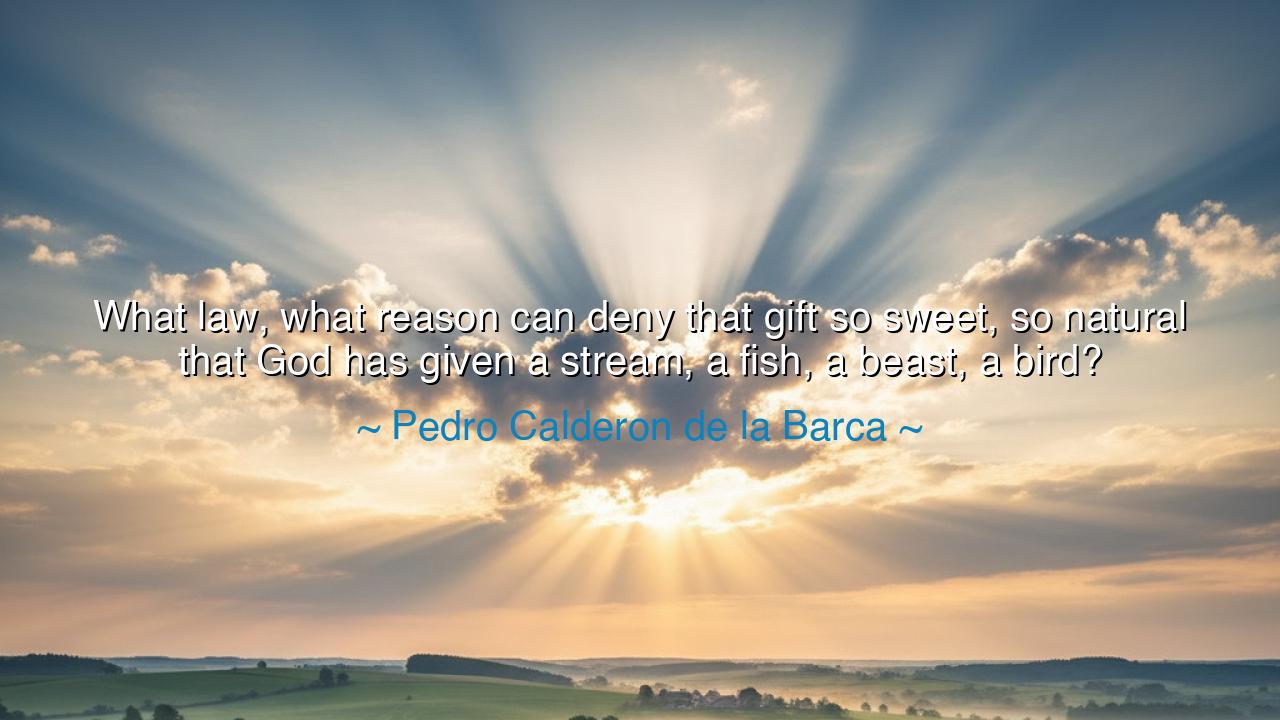
What law, what reason can deny that gift so sweet, so natural
What law, what reason can deny that gift so sweet, so natural that God has given a stream, a fish, a beast, a bird?






Pedro Calderón de la Barca, dramatist of Spain’s Golden Age and voice of the eternal struggle between man and destiny, once asked: “What law, what reason can deny that gift so sweet, so natural, that God has given a stream, a fish, a beast, a bird?” In this question — which is more like a thunderclap to the conscience than a mere phrase — Calderón appeals to the highest truths: that the gifts of nature, bestowed by the Creator, are beyond the power of human law to strip away, and that to live in harmony with them is to live in accordance with divine will.
The origin of these words lies in Calderón’s constant weaving of theology, philosophy, and poetry. His plays and writings often dealt with the tension between human order and divine order, between the restrictions of man-made law and the boundless generosity of God. Here, the stream, the fish, the beast, the bird stand as symbols of innocence and freedom. None of them knows tyranny; each follows its natural course, obeying only the law written in its being. How, then, can man — frail, fallible, and fleeting — claim authority to forbid what God has freely given?
Consider the example of the peasant uprisings throughout Europe’s history, when simple men and women, driven by hunger, rose against nobles who fenced the forests and rivers, declaring them private property. These peasants, who had once fished freely in the stream and hunted in the woods, asked in their own way the same question Calderón asks: by what law, by what reason, is a man forbidden the bread and the fish that God has placed upon the earth? It was not rebellion against order, but a plea for justice — that the natural and divine gifts should not be chained by the greed of the few.
The ancients, too, recognized this truth. The Stoics declared that the law of nature was higher than the law of kings, that man was born free and with access to the bounty of the earth. To deny a thirsty man a drink from the stream, or a hungry man a catch from the fish, was to rebel against the very order of the universe. Calderón, echoing this timeless wisdom, reminds us that justice is not created by decree, but by alignment with the eternal generosity of God’s creation.
Yet there is more. The gift Calderón speaks of is not only bread for the body, but freedom for the soul. The bird, soaring in the heavens, is a symbol of the spirit’s longing to rise above chains; the stream, flowing unhindered, mirrors the course of a life lived honestly and without obstruction. To deny such gifts — whether by unjust laws or by the small tyrannies of fear and pride — is to cut man off not only from survival, but from his highest calling: to live freely, gratefully, in the grace of God’s design.
The lesson for us is clear: respect the gifts of nature, and do not let greed, law, or false reason blind you to them. If you hold power, wield it with mercy, never hoarding what was meant for all. If you are powerless, remember that no man or system can strip you of your dignity, for your right to breathe, to walk, to drink, to eat, is given not by kings but by God. And if you are caught in the tension between man’s command and divine justice, stand boldly, as Calderón did, and ask: what reason dares deny the gift of heaven?
What must you do, then? Be a steward of these gifts. Protect the rivers and forests, for they are sacred trusts. Share food, water, and shelter freely with those in need, for in doing so you honor the Creator more than by any ritual. And above all, do not let your heart grow callous; see the stream, the fish, the beast, the bird, and remember that they are reminders of freedom, simplicity, and grace — the unchanging testament of God’s generosity.
Thus, let Calderón’s question burn in your soul: “What law, what reason can deny that gift so sweet, so natural, that God has given a stream, a fish, a beast, a bird?” In it is both a cry for justice and a hymn of gratitude. For as long as the streams run, the birds fly, the fish swim, and the beasts roam, man is reminded that life itself is a gift, and no hand but God’s may claim to own it.






AAdministratorAdministrator
Welcome, honored guests. Please leave a comment, we will respond soon